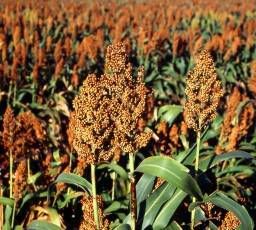ICRISAT launches pro-poor biofuels initiative in drylands
 The International Crops Research Institute for the Semi-Arid Tropics (ICRISAT) is linking poor and marginal farmers of drylands of the developing countries with the global biofuel revolution while strengthening their food and income security.
The International Crops Research Institute for the Semi-Arid Tropics (ICRISAT) is linking poor and marginal farmers of drylands of the developing countries with the global biofuel revolution while strengthening their food and income security.The Andhra-Pradesh based scientific institute, which is a partner of the Consultative Group on International Agricultural Research, is working with governments and industry leaders to develop partnerships that can result in economic benefits for the poor and marginal farmers of the semi-arid tropics, even while retaining the strong economic competitiveness for the industry. The idea is to develop partnerships that link ICRISAT's innovative research directly with farmers and markets.
ICRISAT's unique research on ethanol for biofuel from sweet sorghum (Sorghum bicolor (L.) Moench) (earlier post) and biodiesel from pongamia and jatropha crops, is not only ensuring energy, livelihood and food security to the dryland farmers, but also reducing the use of fossil fuel, which in turn can help in mitigating climate change. These crops meet the main needs of the dryland farmers - they do not require much water, can withstand environmental stress and are not that expensive to cultivate.
"We call this our pro-poor biofuels initiative for the dryland farmers where food security is not compromised. With the fuel prices increasing globally, there is a demand for ethanol from sweet sorghum and biodiesel from pongamia and jatropha. We believe that this provides a wonderful opportunity for dryland farmers to get more money from their farms and wastelands." - William Dar, director general of ICRISAT.ICRISAT scientists have succeeded in breeding sorghum varieties and hybrids in partnership with national agricultural research partners that yield higher amounts of sugar-rich juice from the stems. Conventionally ethanol is produced from sugarcane. The new sweet sorghum scores better than sugarcane on that elusive but crucial goal called 'social sustainability' in that it is a crop of the drylands and the semi-arid tropics, and thus its cultivation can directly benefit the millions of poor and marginal farmers who live there, far away from where any multinational dares to go.
Dr Belum VS Reddy, ICRISAT's Principal Sorghum Breeder, sums up the three main advantages of the sweet sorghum hybrids:
- Food, feed, fiber, fuel: the improved sorghum provides the dryland farmer with grain for food, fodder for livestock and an additional source of income through bioethanol, obtained from the sugar in the canes.
- Water requirements: Sweet sorghum requires only one seventh of the water that is used up by sugarcane.
- Land use: it has the advantage over other biofuel crops that it yields grain as well as ethanol. Rather than replacing land grown to food, the cultivation can stimulate increased yield of grain and stalk, and also fodder from bagasse, the byproduct of the crushes canes. This allows for an integration of farming practises and the environmental benefits that come with this.
Even though the ethanol yield per unit weight of feedstock is lower for sweet sorghum, the much lower production cost for this crop more than compensates for this loss, and sweet sorghum has a competitive cost advantage:
 biomass :: bioenergy :: biofuels :: energy :: sustainability :: sweet sorghum :: food security :: poverty alleviation :: drylands :: plant breeding :: ICRISAT :: Asia :: Africa ::
biomass :: bioenergy :: biofuels :: energy :: sustainability :: sweet sorghum :: food security :: poverty alleviation :: drylands :: plant breeding :: ICRISAT :: Asia :: Africa :: According to provisional numbers based on field trials with the new hybrids, it costs around US$0.29 (Rs 12.79) to produce one liter of ethanol from sweet sorghum, while it costs US$0.33 (Rs 14.55) to produce ethanol from sugarcane.
In addition to the Rusni Distelleries project in India, ICRISAT has signed agreements with five private companies in the Philippines to form a sweet sorghum for ethanol consortium. Further, ICRISAT and Rusni are in the initial stages of exploring such consortia in Uganda, Nigeria, Mozambique and South Africa.
Meanwhile, ICRISAT is promoting the cultivation of pongamia and jatropha crops, from which biodiesel can be extracted. "We have partnered with the Andhra Pradesh Government to permit poor villagers, especially women's groups, to grow pongamia and jatropha on wastelands and collect the fruits," says SP Wani, Regional Theme Leader on Watershed Development, ICRISAT. Once the trees mature, the women can collect the seeds and press out the oil in their villages or sell them to large-scale processors to earn hard cash, he added.
 --------------
--------------


 Indian bioprocess engineering firm Praj wins €11/US$14.5 million contract for the construction of the wheat and beet based bio-ethanol plant for Biowanze SA in Belgium, a subsidiary of CropEnergies AG (a Sudzucker Group Company). The plant has an ethanol production capacity of 300,000 tons per year.
Indian bioprocess engineering firm Praj wins €11/US$14.5 million contract for the construction of the wheat and beet based bio-ethanol plant for Biowanze SA in Belgium, a subsidiary of CropEnergies AG (a Sudzucker Group Company). The plant has an ethanol production capacity of 300,000 tons per year.








0 Comments:
Post a Comment
Links to this post:
Create a Link
<< Home